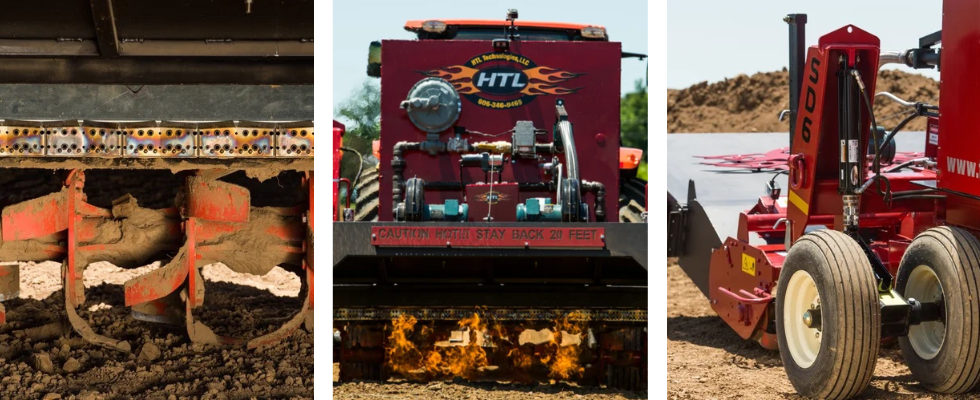
In the construction and earthmoving industries, delays caused by wet, unworkable soil are more than an inconvenience — they’re a financial risk. Propane-powered soil drying solutions are helping companies overcome these challenges by keeping projects on schedule and reducing downtime. For companies working against tight project schedules, waterlogged jobsites can bring progress to a grinding halt, inflate budgets and compromise soil stability.
As a result, contractors and site managers are turning to innovative solutions that harness the power of propane to keep projects on track, even in the face of adverse weather conditions.
One such advancement is soil drying equipment that uses forced hot air and a rototiller to rapidly reduce moisture content in the ground. These systems provide a fast, environmentally conscious and cost-effective alternative to traditional drying methods, such as applying lime or other chemical agents, or relying on time-consuming air drying by mechanically turning the soil. This article explores how forced-air soil drying systems work, the role propane plays in their performance and why they’re increasingly becoming an asset for construction professionals and propane suppliers alike.
The Problem With Wet Soil
Moisture-laden soil affects several aspects of a construction project. Wet ground can make it impossible for heavy equipment to operate safely, undermines the structural integrity of foundations and makes compaction difficult to achieve. Left untreated, it leads to costly remediation steps, extended timelines and compliance challenges on regulated jobsites.
For projects in areas prone to rainfall, flooding or poor drainage, site preparation delays are common. In the past, contractors had limited options: wait for natural drying, apply chemical stabilizers or excavate and replace the wet soil altogether. Each of these approaches comes with its own set of environmental concerns, expenses and time constraints.
Propane & the Rise of Forced-Air Soil Drying
The Soil Dryer from HTL Technologies, for example, works by blowing heated air through the top layers of the ground, while a rototiller throws the soil through the 6 million British thermal unit (Btu) flame, evaporating moisture directly from the soil matrix. These units often include a combination of high-volume blowers, burners, tillers and directional nozzles to achieve uniform drying at rapid speeds.
Propane plays a crucial role here — not only as a clean and powerful fuel source, but as a reliable option for remote or rural jobsites.
Propane-powered soil dryers offer several advantages:
- Portability: With self-contained propane fuel systems, dryers can be deployed anywhere without needing access to natural gas lines or electrical infrastructure.
- Rapid heat output: Propane systems can generate high-Btu outputs quickly, accelerating drying times and allowing crews to resume work in hours rather than days.
- Environmental considerations: Unlike chemical treatments like lime or fly ash, propane combustion emits fewer pollutants and avoids introducing potentially harmful additives into the soil.
- Efficiency: Systems designed to work with propane are engineered for high thermal efficiency, delivering heat exactly where it’s needed with minimal waste.
These benefits make propane-powered dryers a natural fit for projects that demand fast turnaround, particularly in construction, utility trenching or prefoundation work.
Use Cases in the Field
Field testing of propane-powered, forced-air soil and surface drying solutions offers valuable insight into how this technology performs in real-world scenarios. In tests conducted under controlled conditions by engineering firms and equipment developers, these systems have shown measurable reductions in soil moisture content within hours — making them a viable tool for keeping construction projects on schedule.
One such system, tested under a variety of weather and soil conditions, uses a high-capacity burner (6 million Btu) to deliver heated air while simultaneously tilling up to 10 inches deep. Operators have the ability to adjust power and fan settings to fine-tune performance depending on soil type.
Key Data Points From Testing
- Clay and topsoil mix: Reduced moisture from 20.5% to 16.7% in 1.5 hours of full-power passes at a 6-inch depth.
- Clayey silt with sand: Moisture dropped from 25.5% to 15.1% across three passes with decreasing heat settings and final pass using only fan-driven air.
These results show that soil drying systems powered by propane can bring soil close to optimal compaction moisture within a single work session — significantly reducing downtime caused by weather delays. For construction firms and propane suppliers alike, these systems represent a growing opportunity to improve project reliability, especially in wet-weather regions or time-sensitive contracts.
Implications for Propane
For propane marketers and distributors, the growing adoption of soil drying systems represents a unique opportunity to engage new markets. Construction and infrastructure projects operate on seasonal cycles, and the ability to offer propane as a solution during weather-related delays increases its value as a service — not just a fuel.
To capitalize on this, propane businesses can consider:
- Partnering with equipment manufacturers that provide soil dryers
- Offering jobsite delivery and refill services tailored to construction needs
- Educating construction clients on the benefits of propane-powered drying, including fuel efficiency and environmental performance
As industries across the board seek more sustainable and versatile fuel sources, propane continues to prove its adaptability beyond residential and commercial heating. With the right partnerships, it can be positioned as a strategic tool in improving productivity and reducing project risk.
Looking Ahead
Climate unpredictability, stricter environmental regulations and rising construction costs are converging to reshape how projects are planned and executed. Technologies that mitigate weather delays and minimize environmental impact are in high demand. Propane-powered soil dryers meet these needs head-on — speeding up timelines, reducing costs and aligning with modern environmental priorities.
As more contractors discover the advantages of this method, there’s a growing role for propane professionals to help shape how the construction industry tackles one of its oldest challenges: working with the weather, not against it.


